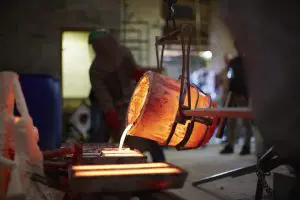Some of the benefits of high-pressure die casting may already be known to you if you have read our article on aluminium die casting. What makes this widely used process in the manufacturing industry so appealing? This article goes into greater detail regarding the operation of pressurised die casting. Read on to learn more about this process.
Table of Contents
Low-Pressure and High-Pressure Die Casting
Metal casting is a process whereby molten metal is poured or injected into a die or mould, and left to solidify into a predetermined shape. The characteristics of the mould and the filling procedure are used to further divide the various casting processes into subgroups. Additionally, depending on the metal used, the injection unit that fills the mould can be either a hot chamber or a cold chamber. In hot chamber die casting, the liquefied metal is first contained within the die casting machine before its being pushed into the mould by an injection piston. On the other hand, cold chamber die casting technology first melts the metal in a separate furnace. The liquefied metal is then left to cool in a holding furnace before being poured into a shot sleeve and injected into the mould.
Both low-pressure and high-pressure systems can be utilised in metal casting. Low-pressure die casting uses an applied pressure of 2.9 to 14.5 psi. This procedure forces the molten metal to travel gradually from a furnace into the mould. High-pressure die casting, on the other hand, is a quicker method that uses a horizontal configuration, whereby the die is rotated about the horizontal axis and thus guarantees die closure. High-pressure machines are rated according to how much closing force they can apply; and ranges from 550 to 5,700 tonnes.
Why High-Pressure Die Casting is Beneficial
You can create intricate near net shapes by using very high pressure to inject molten metal into the mould, which guarantees that it fills completely. It is therefore the preferred choice for structural projects with strict criteria such as dimensional tolerances and stringent aesthetic requirements. Additionally, you can create items with high-quality surface finishes that are ideal for electroplating processes. Even relatively thin-walled components can be cast with high-pressure precision die casting, which is something low-pressure die casting and many other casting techniques cannot do. Another benefit is the quick casting cycles that are achieved by high-pressure die casting. These cycles are excellent for producing several intricate and light-weight components. All the factors above make high-pressure die casting very popular in the manufacturing industry.
Drawbacks of High-Pressure Die Casting
High-pressure die casting, like any other forming method, has drawbacks that can make it unsuitable for some applications. One of which being a high starting and operating expense. Compared to sand or semi-permanent moulds, dies are more expensive to produce due to their complexity. As a result, high-pressure die casting expenses are typically only justifiable when used to produce large quantities of goods.
The short casting cycle of high-pressure die casting, while great for quick production, is only applicable to castings with thinner walls. As such, the added solidification time may outweigh the advantages of quick injection if the casting is sufficiently thick.
The cast’s potential for porosity from air pockets is another drawback. Porosity can be brought on by several factors, including an improper alloy being used for the casting, shrinkage of the casting material during cooling, and the speed at which the mould is filled.
Choose EKO For Your High-Pressure Die Casting Needs
Looking for a die casting parts manufacturer to assist in your die casting needs? With more than 20 years of industry expertise, EKO Industries has partnered with a diverse range of companies, some of which include those from the Network & Telecommunications, Medical, Oil & Gas, Automotive, and Industrial Parts industries. Speak to us to find out more about our die casting services today.



